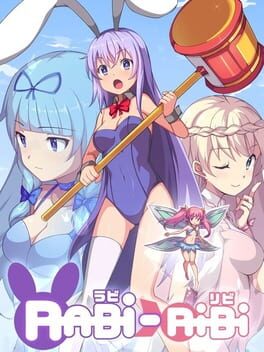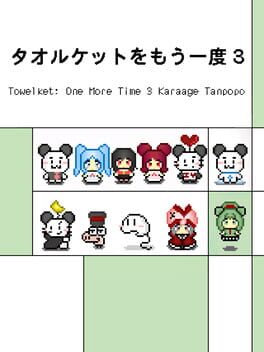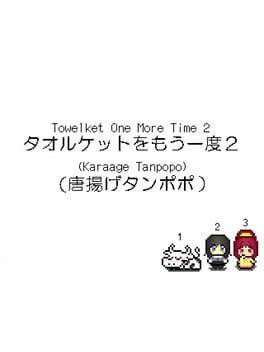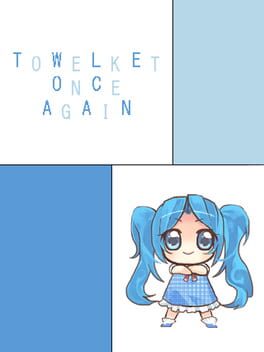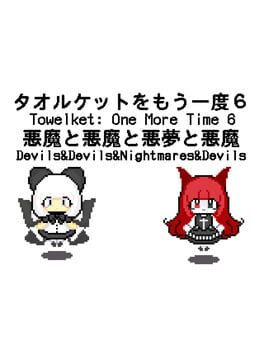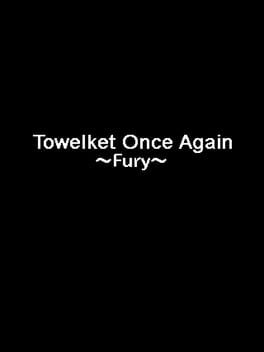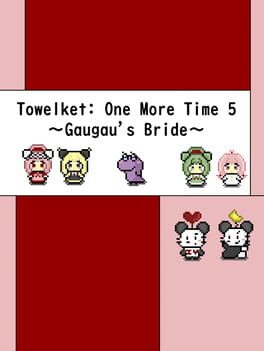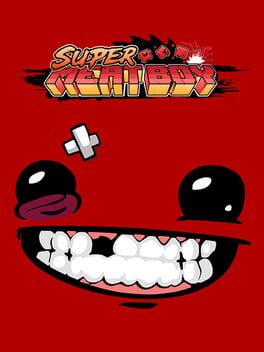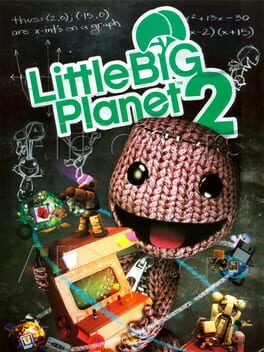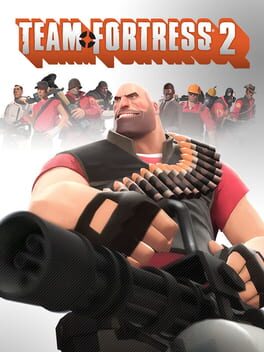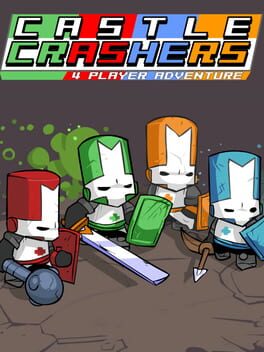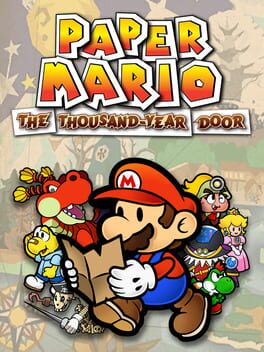TouhouEnjoyer
2016
Stupidly in-depth combat mechanics that flows like no other, tons of unique and interesting bosses, incredibly fun movement from beginning to end, rewarding exploration incentivized through useful collectibles galore, near infinite replayability due to the many different viable play styles and routes, some of the most fine-tuned and purposeful difficulty options of all time, glitches and exploits are embraced and encouraged by the game design allowing multifaceted approaches to the game’s systems, extensive optional modes and bonus content, QoL is through the roof with quick loads and item management, boss rush + speedrun modes are awesome, and it even has a solid OST.
Unparalleled. One of the best games ever made.
Unparalleled. One of the best games ever made.
Towelket 3 is the first game in the long-running series created by Kanao, and it's a rather unknown little hidden gem of a series. It's an RPG Maker game that Manlybadasshero hasn't played, so it's got niche credentials, as well as an enigmatic appeal similar to Touhou, which led it to becoming popular in some Japanese subcultures. While the series would later come to be known for its heavy plots and unique comedy, Towelket 3 is surprisingly tame, more 'standard' compared to later entries, but that gives it a charm of its own.
One thing to appreciate about Towelket 3: it’s great at keeping the energy high with weirdass set pieces: an ant hill, inside electrical currents, the moon…I mean, the story literally begins inside a vacuum cleaner. It’s always mixing you up and finding some new narrative device to surprise and confuse you. The morbid tone seems to act in lockstep, occasionally reminding you how cruel the Towelket universe can be, painting the picture of a world fueled by that one Epicurus quote: "Is God willing, but not able...?" And yet it maintains self-aware wholesomeness in the face of painful adversity - this is what the series excels at. Even though I'm not a fan of turn-based combat, I appreciate that this game is actually trying to weave so many tones and plot devices while striving to be a straightforward, non-grindy JRPG adventure, providing a refreshing break from the typical view of RPG Maker as merely a horror game template. The characters and world are cute, yet the story is unpredictable enough to keep the stakes very high and the combat meaningful, allowing players to forge a fun little camaraderie with them all even though the characterization isn't deep. The only character that was somewhat sketchy for me was the Pon Groom, who's entire existence is just the shitty "uuoooohhh!!" meme. I'll give Towelket points for being early to the party in making fun of this archetype, but some may find his antics too unappealing to handle.
Towelket 3 is a very impressive work for the first in the series, and I feel it’s fairly overlooked for being the one to establish the setting and tone, and for being an adorable, surreal JRPG adventure that's a breezy length and has well balanced combat.
And also for featuring the most badass Pucchi of course.
One thing to appreciate about Towelket 3: it’s great at keeping the energy high with weirdass set pieces: an ant hill, inside electrical currents, the moon…I mean, the story literally begins inside a vacuum cleaner. It’s always mixing you up and finding some new narrative device to surprise and confuse you. The morbid tone seems to act in lockstep, occasionally reminding you how cruel the Towelket universe can be, painting the picture of a world fueled by that one Epicurus quote: "Is God willing, but not able...?" And yet it maintains self-aware wholesomeness in the face of painful adversity - this is what the series excels at. Even though I'm not a fan of turn-based combat, I appreciate that this game is actually trying to weave so many tones and plot devices while striving to be a straightforward, non-grindy JRPG adventure, providing a refreshing break from the typical view of RPG Maker as merely a horror game template. The characters and world are cute, yet the story is unpredictable enough to keep the stakes very high and the combat meaningful, allowing players to forge a fun little camaraderie with them all even though the characterization isn't deep. The only character that was somewhat sketchy for me was the Pon Groom, who's entire existence is just the shitty "uuoooohhh!!" meme. I'll give Towelket points for being early to the party in making fun of this archetype, but some may find his antics too unappealing to handle.
Towelket 3 is a very impressive work for the first in the series, and I feel it’s fairly overlooked for being the one to establish the setting and tone, and for being an adorable, surreal JRPG adventure that's a breezy length and has well balanced combat.
And also for featuring the most badass Pucchi of course.
"On ne naît pas femme, on le devient."
Towelket 2 is a profoundly haunting experience with so much emotional gravitas packed into such a short playtime that you would've forgotten Kanao's previous game was Towelket 3. While that game was silly, irreverent, yet sporadically morbid, 2 is more stripped back and deliberate. Magic is gone. Weapons and armor are ordinary objects and clothing. And anything that happens to a character is permanent. One of the things I loved about 3 regardless, though, was its perspective switching: how it forced you into the shoes of characters besides your own. 2's utilization of this is remarkably effective combined with the more focused cast. It's downright cinematic at several points. Paripariume leaves for the city, an unfamiliar place where she is just a small fish. The game then cuts to Mocchi, in an alien spaceship (which even looks vaguely like a train), drawing an effective thematic parallel. All the characters represent different ways society oppresses, yet their pain is shared. Mitsue is a temporary recipient of, and eventual victim to, society's beauty standards. Ketsuago, ‘clever girl,’ has created a society herself, yet is still unable to change the wider attitudes. Paripariume, a deeply tragic victim of patriarchy, clings to memories she felt were free from the world’s twisted, contradictory expectations in order to keep pushing forward even as she, once an exemplary human being, is broken down, Mocchi serving as her mirror both physically and spiritually. It felt like there was so much thought put into the construction of this story, and if anything, the writing was so strong I just wish it were longer, because media that handles shocking graphic/sexual content without feeling forced or tactless is surprisingly rare. But please be warned: although I think the writing is nuanced enough it’s possible to draw some positive conclusions, it is hellishly dark in its portrayal of these issues. I had some difficulty sleeping afterwards.
Gameplay-wise, it's a massive step up from 3, but I would struggle to call the combat itself interesting. Autoing every battle is genuinely the best option most of the time, though I guess I do prefer simple turn-based RPGs to be easy, so this is not a huge downside to me personally. However, I think this was the game where Towelket came into its own with regards to gameplay mechanics. The flower garden ensures smooth progression so you don't necessarily need to be constantly updating your equipment, Elizabeth is a genuinely good character hidden within a hint menu, and the Mind system is one of my favorite ideas in any RPG ever. Not necessarily for gameplay repercussions, but more in terms of thematics. It lets players reminisce on the story so far, providing a breather, and granting abilities and powers for interacting with all the game has to offer. Memories imbue you with the strength to move forward, but at the same time cannot let you escape reality. The story not only acknowledges a frightening dichotomy within its own philosophy, but masterfully ties together this concept with ideas that seem to mirror what an indie developer might say about their own work. -These games, our personal works of art, are the culmination of everything that brought us to this point. We have things we want players to see, and not see, and it is within this intimate space we are allowed a connection between creators’ and players’ brains. Eventually it ends, the connection terminated, but if our souls conjoined just once, it will have all been worth it. -
In a sense, Kanao found a way to justify their predilection to absurdity and morbidity by applying it to characters with experiences all too familiar with reality. As if they’re saying: "This world is really what's morbid here!" Yet there’s only so much we can do in the face of the seemingly unbreakable systems of oppression. And that is true horror.
Towelket 2 is a profoundly haunting experience with so much emotional gravitas packed into such a short playtime that you would've forgotten Kanao's previous game was Towelket 3. While that game was silly, irreverent, yet sporadically morbid, 2 is more stripped back and deliberate. Magic is gone. Weapons and armor are ordinary objects and clothing. And anything that happens to a character is permanent. One of the things I loved about 3 regardless, though, was its perspective switching: how it forced you into the shoes of characters besides your own. 2's utilization of this is remarkably effective combined with the more focused cast. It's downright cinematic at several points. Paripariume leaves for the city, an unfamiliar place where she is just a small fish. The game then cuts to Mocchi, in an alien spaceship (which even looks vaguely like a train), drawing an effective thematic parallel. All the characters represent different ways society oppresses, yet their pain is shared. Mitsue is a temporary recipient of, and eventual victim to, society's beauty standards. Ketsuago, ‘clever girl,’ has created a society herself, yet is still unable to change the wider attitudes. Paripariume, a deeply tragic victim of patriarchy, clings to memories she felt were free from the world’s twisted, contradictory expectations in order to keep pushing forward even as she, once an exemplary human being, is broken down, Mocchi serving as her mirror both physically and spiritually. It felt like there was so much thought put into the construction of this story, and if anything, the writing was so strong I just wish it were longer, because media that handles shocking graphic/sexual content without feeling forced or tactless is surprisingly rare. But please be warned: although I think the writing is nuanced enough it’s possible to draw some positive conclusions, it is hellishly dark in its portrayal of these issues. I had some difficulty sleeping afterwards.
Gameplay-wise, it's a massive step up from 3, but I would struggle to call the combat itself interesting. Autoing every battle is genuinely the best option most of the time, though I guess I do prefer simple turn-based RPGs to be easy, so this is not a huge downside to me personally. However, I think this was the game where Towelket came into its own with regards to gameplay mechanics. The flower garden ensures smooth progression so you don't necessarily need to be constantly updating your equipment, Elizabeth is a genuinely good character hidden within a hint menu, and the Mind system is one of my favorite ideas in any RPG ever. Not necessarily for gameplay repercussions, but more in terms of thematics. It lets players reminisce on the story so far, providing a breather, and granting abilities and powers for interacting with all the game has to offer. Memories imbue you with the strength to move forward, but at the same time cannot let you escape reality. The story not only acknowledges a frightening dichotomy within its own philosophy, but masterfully ties together this concept with ideas that seem to mirror what an indie developer might say about their own work. -These games, our personal works of art, are the culmination of everything that brought us to this point. We have things we want players to see, and not see, and it is within this intimate space we are allowed a connection between creators’ and players’ brains. Eventually it ends, the connection terminated, but if our souls conjoined just once, it will have all been worth it. -
In a sense, Kanao found a way to justify their predilection to absurdity and morbidity by applying it to characters with experiences all too familiar with reality. As if they’re saying: "This world is really what's morbid here!" Yet there’s only so much we can do in the face of the seemingly unbreakable systems of oppression. And that is true horror.
It would be difficult for anyone to follow up the decidedly serious sociopolitical commentary of Towelket 2, but through its opening mantra, "ゲームの主人公みたく4方向で歩きましょう," Towelket Once Again cleverly addresses and effectively bridges the tone gap between the previous two entries while mixing in some sardonic philosophical wit, illuminating that it is not simply a return to the tradition of Towelket 3. Once Again is somber: subtly whittling away at you, eroding perception of time and place, and provoking what it means to be human in a very Cyberpunk Buddhist sense.
At first, I thought the absence of the "心の中'' system was a disappointing step back, but it grew on me because of how it ultimately contrasted to Towelket 2’s sparse nature. Once Again distinguishes itself by imploring you to stop and smell the burnt roses, abandoning a focused plot for more character interactions. The conversation events scattered throughout represent the here and now as a reason to continue forward, whether it be a funny joke, wholesome character moment, or exposition about the world, and while you could go through the game without checking most of them, I'd imagine the story is a lot more grim and hopeless that way. It must be your conscious decision to become invested and care, to enjoy those fleeting moments and store the most memorable ones in your very own 心の中, which is made easy thanks to Kanao's naturalistic, endearing writing style (can't speak for the English translation). I like how, despite their appearances, the characters never come off as too ridiculous, and this lack of insistence also helps sell the dialogue and humor. Once Again actually might be the most "original" in the whole series in premise and writing style alone, but it simultaneously creatively weaves together elements from previous games, the humor, morbidity, surprising wholesomeness, with a newfound appreciation for contemplation and friendship which make the terrifying moments all the more affecting. Once Again works well also because it's deftly interconnected, with its writing built around the theme of "cycles'' allowing the plot to call back to relevant information from earlier in the story, bringing it to a greater meaning and giving a real sense of closure without overstaying its welcome, accomplishing a satisfyingly extensive plot within a condensed 5-7 hours.
I'm glad that this series continues to push the narrative capabilities of the niche medium of "actually trying to be a bonafide RPG" RPG Maker games. Even if the combat leaves much to be desired, Once Again proved that Kanao has an ambitious author's soul buried inside. There is something to be said about Towelket 2's minimalism, but for a sequel with such a different vibe, Kanao was able to step up and make a uniquely hilarious, wholesome journey through existential dread.
At first, I thought the absence of the "心の中'' system was a disappointing step back, but it grew on me because of how it ultimately contrasted to Towelket 2’s sparse nature. Once Again distinguishes itself by imploring you to stop and smell the burnt roses, abandoning a focused plot for more character interactions. The conversation events scattered throughout represent the here and now as a reason to continue forward, whether it be a funny joke, wholesome character moment, or exposition about the world, and while you could go through the game without checking most of them, I'd imagine the story is a lot more grim and hopeless that way. It must be your conscious decision to become invested and care, to enjoy those fleeting moments and store the most memorable ones in your very own 心の中, which is made easy thanks to Kanao's naturalistic, endearing writing style (can't speak for the English translation). I like how, despite their appearances, the characters never come off as too ridiculous, and this lack of insistence also helps sell the dialogue and humor. Once Again actually might be the most "original" in the whole series in premise and writing style alone, but it simultaneously creatively weaves together elements from previous games, the humor, morbidity, surprising wholesomeness, with a newfound appreciation for contemplation and friendship which make the terrifying moments all the more affecting. Once Again works well also because it's deftly interconnected, with its writing built around the theme of "cycles'' allowing the plot to call back to relevant information from earlier in the story, bringing it to a greater meaning and giving a real sense of closure without overstaying its welcome, accomplishing a satisfyingly extensive plot within a condensed 5-7 hours.
I'm glad that this series continues to push the narrative capabilities of the niche medium of "actually trying to be a bonafide RPG" RPG Maker games. Even if the combat leaves much to be desired, Once Again proved that Kanao has an ambitious author's soul buried inside. There is something to be said about Towelket 2's minimalism, but for a sequel with such a different vibe, Kanao was able to step up and make a uniquely hilarious, wholesome journey through existential dread.
There are some neat ideas here, but Towelket 6 is ultimately too slapdash to have the same impact as previous entries.
Let’s start with the good. I liked the increased emphasis on dialogue: it was often entertaining. Some of the developments from previous games were cool, like Conchelle becoming the caretaker of an orphanage, as well as Paripariume’s role as Minpou’s mother, which was incredibly heart wrenching and probably the best written section of the story. It also introduces Warawau and Nyanyamo, who will go on to star in a much better game. That's about it.
There’s much I could say about the writing or characters, but it was hard for me to focus on anything because actually playing the game was a true test of patience. I thought Towelket 1 found an elegant solution to the dialogue system, where interactions were condensed into conversation events, but 6 throws this out the window to pad out the game. To get the full experience, you have to talk to every goddamn party member on each screen. Possibly as a result, much of the dialogue in the second half became repetitive, where characters would state really obvious things or the same jokes from previous rooms. Some of the dialogue was broken, like, just literally empty text boxes. Also, and maybe this only bothers me, but sometimes a major character development would happen where their entire personality changes, and then you go back into the previous room and they say the same lines as before. The other games were not this lazy.
That's the key word. It just felt like Towelket 6 didn’t care. Say what you will about the other games in the series, but they made sense despite the very warped, surreal perspective the series provided. There is nothing to explain how Warawau was in space, and not suffocating from lack of oxygen. Or how none of the Pons seem to care that your party exists. Or why Pucchi couldn’t have just warped everyone to Nyanyamo (maybe I forgot the reason, but either way it’s a bad plot device).
Not to say the writing was devoid of substance: there’s still the trademark Towelket dark feminism, mostly focusing on showing the effects of conservative patriarchy on women’s mental health framed through a sort of subversion of magical girl plots (or Earthbound maybe?), but the developments in the second half were just so rushed and flaccid. If you really want this sort of thing, 2 and Fury exist.
Oh yeah, and that cliffhanger ending was so poorly done I had to double check whether I had the なんつって in my inventory.
Let’s start with the good. I liked the increased emphasis on dialogue: it was often entertaining. Some of the developments from previous games were cool, like Conchelle becoming the caretaker of an orphanage, as well as Paripariume’s role as Minpou’s mother, which was incredibly heart wrenching and probably the best written section of the story. It also introduces Warawau and Nyanyamo, who will go on to star in a much better game. That's about it.
There’s much I could say about the writing or characters, but it was hard for me to focus on anything because actually playing the game was a true test of patience. I thought Towelket 1 found an elegant solution to the dialogue system, where interactions were condensed into conversation events, but 6 throws this out the window to pad out the game. To get the full experience, you have to talk to every goddamn party member on each screen. Possibly as a result, much of the dialogue in the second half became repetitive, where characters would state really obvious things or the same jokes from previous rooms. Some of the dialogue was broken, like, just literally empty text boxes. Also, and maybe this only bothers me, but sometimes a major character development would happen where their entire personality changes, and then you go back into the previous room and they say the same lines as before. The other games were not this lazy.
That's the key word. It just felt like Towelket 6 didn’t care. Say what you will about the other games in the series, but they made sense despite the very warped, surreal perspective the series provided. There is nothing to explain how Warawau was in space, and not suffocating from lack of oxygen. Or how none of the Pons seem to care that your party exists. Or why Pucchi couldn’t have just warped everyone to Nyanyamo (maybe I forgot the reason, but either way it’s a bad plot device).
Not to say the writing was devoid of substance: there’s still the trademark Towelket dark feminism, mostly focusing on showing the effects of conservative patriarchy on women’s mental health framed through a sort of subversion of magical girl plots (or Earthbound maybe?), but the developments in the second half were just so rushed and flaccid. If you really want this sort of thing, 2 and Fury exist.
Oh yeah, and that cliffhanger ending was so poorly done I had to double check whether I had the なんつって in my inventory.
Fury is cool because it feels like a true companion piece to Towelket 2. Sure, that game had undeniably feminist themes, but it was more concerned with a dissection of patriarchy and the effects in its totality. Fury goes even further beyond with its portrayal of family and gender, society's attitude towards marriage and procreation, with stomach-churning imagery depicting the twisted nature of our world and its bountiful unjust cruelty. It leaves a strong impression as an independently-produced piece of art, which is no surprise coming from this series.
I really liked how Fury didn't hold anything back in its goal of elucidating the woman condition, but…it's hard to explain, but something felt missing from Fury. Like, yeah, I know it was basically an abandoned project, but I'm talking more abstractly. Towelket 2, I think, justified its game-isms more thoroughly. Aside from the dynamic 心の中 and flower garden systems which deepened the connection between players and the story, it was generally colored like a survival game, so interacting and exploring around felt like it had weight. Playing as PPU for the first time after the timeskip was unsettling because the presentation conjoined with the writing in a way which allowed your mind to fill in the gaps, creating a narrative all its own. Fury's gameplay sections had a bit too much downtime in between major plot points, which is fine, I just feel like its predecessors made use of that time better. Compared to 2, though, I actually really enjoyed the humor integration here that feels distinct even within the context of a series known for dark comedy. The resulting bizarro, existential atmosphere is truly interesting.
Fury is messy, uneven, and confused, and with unfinished, buggy combat and exploration, but because of the subject matter, it's fitting in a way. I continue to appreciate Towelket's topical focus and ambition, and even in skeletal form, I think Kanao has some really intriguing ideas worth checking out.
If one thing's for sure, the joke ending in this game is easily the best in the series.
I really liked how Fury didn't hold anything back in its goal of elucidating the woman condition, but…it's hard to explain, but something felt missing from Fury. Like, yeah, I know it was basically an abandoned project, but I'm talking more abstractly. Towelket 2, I think, justified its game-isms more thoroughly. Aside from the dynamic 心の中 and flower garden systems which deepened the connection between players and the story, it was generally colored like a survival game, so interacting and exploring around felt like it had weight. Playing as PPU for the first time after the timeskip was unsettling because the presentation conjoined with the writing in a way which allowed your mind to fill in the gaps, creating a narrative all its own. Fury's gameplay sections had a bit too much downtime in between major plot points, which is fine, I just feel like its predecessors made use of that time better. Compared to 2, though, I actually really enjoyed the humor integration here that feels distinct even within the context of a series known for dark comedy. The resulting bizarro, existential atmosphere is truly interesting.
Fury is messy, uneven, and confused, and with unfinished, buggy combat and exploration, but because of the subject matter, it's fitting in a way. I continue to appreciate Towelket's topical focus and ambition, and even in skeletal form, I think Kanao has some really intriguing ideas worth checking out.
If one thing's for sure, the joke ending in this game is easily the best in the series.
The Towelket series has been a bumpy ride. It’s kind of crazy to think the entire mainline series was made within the span of two years, but this is the end: Gaugau’s Bride. And it totally throws out the rulebook, in true Towelket fashion. To give you an idea of what this game is like, the "なんつって" item, which is usually offered to give players the option of seeing an alternate gag ending, actually doesn’t change anything in Gaugau’s Bride. It just adds a 10 minute bonus cutscene after it’s all over. Yes. This game, in its entirety, is one big gag ending. Maybe the Towelket Fury Penis Ending was actually canon after all.
I attribute this mostly to the Towelket dev’s increasing interest in writing comedic games like Nekoashi Otome, as this game feels more in common with that than any previous Towelkets. While this may be disappointing to those who appreciate the series' more dramatic elements, Gaugau’s Bride works as an entertaining piece of fan service because of its more lackadaisical comedy sketch format and its total disregard for the fourth wall, with a plot that mirrors Verne's Journey to the Center of the Earth, but with even more weird sci-fi twists and lots of surreal, perverted humor. Panties, bras, penis, vaginas, friction between the two - it’s Towelket at its raunchiest. Also, since this game features dinosaurs, Kanao of course doesn’t miss out on a few puns: “Penissaurus'' comes to mind.
So, the #1 question that determines whether you should play Towelket 5: is it funny? Well, I would say mostly, yeah. It can be clever, strange, and there's more effort put into the jokes' timing and delivery (The cats' introduction and Pucchi's redemption arc were highlights). The meta humor is hit or miss, but at least it's consistently absurd and actually contextualized later in the story. Unfortunately, there was one aspect of the humor I wasn't a fan of.
I can tell that Kanao has a lot of respect for Towelket 2 seeing how much they reference it in…every single game, and this one is no exception, but the gags are more blatantly parody-like. They can be funny, but you know, paradoxically, despite Kanao deleting Towelket Fury, which was originally supposed to be the fifth one, for apparently being too graphic and offensive, I actually found this game to be MORE offensive than Fury precisely because it doesn’t take anything seriously. About an hour into the game, Ponpe is sexually assaulted, and then the camera fades to black and back, and there she is, in the famous pose: “ああ。。。汚れた。” It’s funny because rape! I know Kanao has enough self-awareness to understand, in fact, maybe that's the point, as Towelket 5 drowns in the artifice of fiction, perhaps doubling as a commentary on how cruelty towards women is normalized in the media industry, and it’s probably also a jab at people who just want Kanao to make Towelket 2 again and again and again, as well as people who like that game for the wrong reasons. I dunno, I mean, it’s TOWELKET, so far be it from me to complain about dark humor, but I just found it not very funny at several points.
While it's not the most tasteful, I'd say this game is worth checking out for Roppenchu alone: she is a super entertaining character and proof that Kanao can write a great lead who isn't a silent protag. Although the necessity of this game is questionable after the release of Nekoashi Otome, if you're just looking to inject a short 3 hour burst of that concentrated off-the-wall Towelket humor into your veins, and you know Japanese, I'd recommend this.
I attribute this mostly to the Towelket dev’s increasing interest in writing comedic games like Nekoashi Otome, as this game feels more in common with that than any previous Towelkets. While this may be disappointing to those who appreciate the series' more dramatic elements, Gaugau’s Bride works as an entertaining piece of fan service because of its more lackadaisical comedy sketch format and its total disregard for the fourth wall, with a plot that mirrors Verne's Journey to the Center of the Earth, but with even more weird sci-fi twists and lots of surreal, perverted humor. Panties, bras, penis, vaginas, friction between the two - it’s Towelket at its raunchiest. Also, since this game features dinosaurs, Kanao of course doesn’t miss out on a few puns: “Penissaurus'' comes to mind.
So, the #1 question that determines whether you should play Towelket 5: is it funny? Well, I would say mostly, yeah. It can be clever, strange, and there's more effort put into the jokes' timing and delivery (The cats' introduction and Pucchi's redemption arc were highlights). The meta humor is hit or miss, but at least it's consistently absurd and actually contextualized later in the story. Unfortunately, there was one aspect of the humor I wasn't a fan of.
I can tell that Kanao has a lot of respect for Towelket 2 seeing how much they reference it in…every single game, and this one is no exception, but the gags are more blatantly parody-like. They can be funny, but you know, paradoxically, despite Kanao deleting Towelket Fury, which was originally supposed to be the fifth one, for apparently being too graphic and offensive, I actually found this game to be MORE offensive than Fury precisely because it doesn’t take anything seriously. About an hour into the game, Ponpe is sexually assaulted, and then the camera fades to black and back, and there she is, in the famous pose: “ああ。。。汚れた。” It’s funny because rape! I know Kanao has enough self-awareness to understand, in fact, maybe that's the point, as Towelket 5 drowns in the artifice of fiction, perhaps doubling as a commentary on how cruelty towards women is normalized in the media industry, and it’s probably also a jab at people who just want Kanao to make Towelket 2 again and again and again, as well as people who like that game for the wrong reasons. I dunno, I mean, it’s TOWELKET, so far be it from me to complain about dark humor, but I just found it not very funny at several points.
While it's not the most tasteful, I'd say this game is worth checking out for Roppenchu alone: she is a super entertaining character and proof that Kanao can write a great lead who isn't a silent protag. Although the necessity of this game is questionable after the release of Nekoashi Otome, if you're just looking to inject a short 3 hour burst of that concentrated off-the-wall Towelket humor into your veins, and you know Japanese, I'd recommend this.
2020
A kaleidoscopic beauty of hand painted environments and lovingly crafted, impeccably voiced dialogue and character dynamics that take sensible liberties with Greek mythology. However, in practice, Hades just doesn't work as a game, because it's incredibly mindless. The combat has too little depth, and I never really had to put forth any effort to do well, even while constantly ramping up the difficulty. There needed to be more enemy types or different moves you could unlock for each weapon or something to spice things up aside from the underwhelming legendary aspects and keepsakes, especially because the story progression was far too slow paced for its own good. It may as well be a mobile game.
2010
2011
2007
2022
I'm glad this series has finally achieved the popularity it deserved, but perhaps this has also been its undoing, as every unconventional, but interesting feature from Demon's and Dark Souls has been stripped out for mainstream appeal, and though this did not begin with Elden Ring, it is the clearest departure towards "popcorn shounen anime" and embracing high octane action the series was never built for, additionally exposing a lack of innovation on FromSoft's part. Yes, many bosses and areas are reused, the game balance is ridiculously off the mark, delayed attack timings are abused to the point of predictable conformity, warping makes exploration gutless, and the NPCs are far less interesting than previous Souls, but what really bothers me is that Elden Ring represents all this series has lost - what once made it unique. This is no longer a game with consequences for player choice, or one where you must use your brain. It's a game where you press the roll button at the right time.
2018
Celeste not only has amazingly deep mechanics that allow players to be highly mobile and have a feeling of mastery over its many challenges, but it does all of this with good reason. The story is nothing spectacular, but it's remarkably effective as a character journey despite its sort of simplistic portrayal of trans struggles. I would imagine the way players continue to improve at the mechanics is similar to what Madeline felt as she grew more accepting of herself, her body, her mind, over the course of the narrative, and that is effective diegetic storytelling and one of the best motivators in any platformer out there.
But you're really playing this for the challenge. It doesn't disappoint on this front. And, listen, I've beaten every single Mega Man game, beaten I Wanna Be the Guy like 3 times, 100 percented Rabi Ribi on the hardest difficulty, and Chapter 9 still gave me trouble. This chapter will single handedly teach you how to play like a speedrunner, because that's basically the only way to beat it. And while I love a challenge, I think it's to a fault. It just dragged and dragged to the point of annoyance for me. It's touching and all, but playing it was a nightmare. Aside from Chapter 9, it's essentially a perfect game.
But you're really playing this for the challenge. It doesn't disappoint on this front. And, listen, I've beaten every single Mega Man game, beaten I Wanna Be the Guy like 3 times, 100 percented Rabi Ribi on the hardest difficulty, and Chapter 9 still gave me trouble. This chapter will single handedly teach you how to play like a speedrunner, because that's basically the only way to beat it. And while I love a challenge, I think it's to a fault. It just dragged and dragged to the point of annoyance for me. It's touching and all, but playing it was a nightmare. Aside from Chapter 9, it's essentially a perfect game.
2008
The strength in Paper Mario comes in its colorful diversity of locales and stories, and compared to its predecessor, TTYD feels much more coherent, purposeful, and creative in how each chapter is written. Chapter 1 of the first game is about some Koopa who got his shell stolen for some reason and then you have to go to a castle because I guess one of the Star Spirits is there for some reason. In Thousand Year Door, you meet up with an angsty, insecure young teen Koopa who’s currently going through relationship troubles and who wants to confront his trauma and find the truth behind his dad’s death, and THEN you accompany him to a castle to help him do that, happening upon a star as you near the end. The “fulfilling the legendary prophecy” stuff almost feels backseat to all the fun little narratives each chapter provides, and this does a much better job of characterizing and getting you attached to Mario’s partners as a result. Even the intermissions featuring Peach and Bowser doing their own things have plenty of charm and directly tie into the main plot in a far more complex manner than the first game. Not exactly high art, it’s a Mario game for children, but pretty engaging.
The gameplay is quite enjoyable for a turn based RPG, with the parry and stylish moves adding a reasonable amount of skill and interactivity to each encounter, although it suffers a bit from being too easy; only the final bosses pose any challenge. While some may not mind, the real objective flaws in its gameplay involve the backtracking: it’s all throughout, but specifically Chapters 4 and 7 have an insane amount of it (the General White quest was awful), and I actually wouldn’t have minded a fast travel system. Chapter 3’s battles are pretty repetitive and boring as well, so this game definitely has the occasional issue with not respecting your time, but it remains my favorite RPG on the Gamecube.
The gameplay is quite enjoyable for a turn based RPG, with the parry and stylish moves adding a reasonable amount of skill and interactivity to each encounter, although it suffers a bit from being too easy; only the final bosses pose any challenge. While some may not mind, the real objective flaws in its gameplay involve the backtracking: it’s all throughout, but specifically Chapters 4 and 7 have an insane amount of it (the General White quest was awful), and I actually wouldn’t have minded a fast travel system. Chapter 3’s battles are pretty repetitive and boring as well, so this game definitely has the occasional issue with not respecting your time, but it remains my favorite RPG on the Gamecube.
